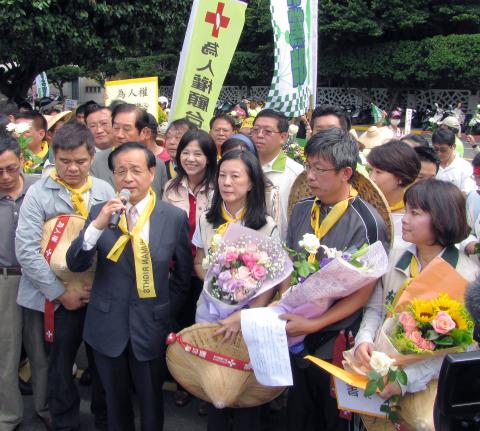Former president Chen Shui-bian (陳水扁) had a slight fever which could be related to an infection, his son, Chen Chih-chung (陳致中), said yesterday.
Chen Chih-chung broke the news in a Facebook post, saying the cause behind his father’s illness has yet to be determined, but it could be related to a urinary tract infection.
Meanwhile, former Northern Taiwan Society director Janice Chen (陳昭姿) blasted the Taipei Veterans General Hospital (TVGH), where Chen is staying for treatment, for not disclosing medical information to a group of physicians who are also the former president’s supporters.

Photo: CNA
Chen Shiu-bian is serving a 17-and-a-half-year sentence for corruption in Taipei Prison, but he was allowed an extended stay in a hospital after his health deteriorated.
A previous examination found that he may have suffered a minor stroke in prison.
His family and supporters have been locked in a debate with the Ministry of Justice, Taipei Prison and several hospitals over their handling of his medical treatment, accusing them of having a political and ideological agenda behind the measures taken.
The Foundation of Medical Professionals Alliance in Taiwan voiced support for Chen Shui-bian’s medical rights at a press conference yesterday.
The foundation said the ministry’s decision to send him to TVGH was made out of political consideration rather than a professional medical decision and questioned the hospital’s examination methods.
It said the hospital should hold a daily press conference to disclose his condition and allow a group of physicians who were close to Chen Shui-bian join the medical task force to make a final assessment of his health.
Meanwhile, about 100 supporters from southern Taiwan gathered in front of the hospital yesterday and expressed support for the former president, saying he should have the freedom to choose whichever hospital he wished to be treated.

Taiwanese can file complaints with the Tourism Administration to report travel agencies if their activities caused termination of a person’s citizenship, Mainland Affairs Council Minister Chiu Chui-cheng (邱垂正) said yesterday, after a podcaster highlighted a case in which a person’s citizenship was canceled for receiving a single-use Chinese passport to enter Russia. The council is aware of incidents in which people who signed up through Chinese travel agencies for tours of Russia were told they could obtain Russian visas and fast-track border clearance, Chiu told reporters on the sidelines of an event in Taipei. However, the travel agencies actually applied

New measures aimed at making Taiwan more attractive to foreign professionals came into effect this month, the National Development Council said yesterday. Among the changes, international students at Taiwanese universities would be able to work in Taiwan without a work permit in the two years after they graduate, explainer materials provided by the council said. In addition, foreign nationals who graduated from one of the world’s top 200 universities within the past five years can also apply for a two-year open work permit. Previously, those graduates would have needed to apply for a work permit using point-based criteria or have a Taiwanese company

The Shilin District Prosecutors’ Office yesterday indicted two Taiwanese and issued a wanted notice for Pete Liu (劉作虎), founder of Shenzhen-based smartphone manufacturer OnePlus Technology Co (萬普拉斯科技), for allegedly contravening the Act Governing Relations Between the People of the Taiwan Area and the Mainland Area (臺灣地區與大陸地區人民關係條例) by poaching 70 engineers in Taiwan. Liu allegedly traveled to Taiwan at the end of 2014 and met with a Taiwanese man surnamed Lin (林) to discuss establishing a mobile software research and development (R&D) team in Taiwan, prosecutors said. Without approval from the government, Lin, following Liu’s instructions, recruited more than 70 software

Taiwanese singer Jay Chou (周杰倫) plans to take to the courts of the Australian Open for the first time as a competitor in the high-stakes 1 Point Slam. The Australian Open yesterday afternoon announced the news on its official Instagram account, welcoming Chou — who celebrates his 47th birthday on Sunday — to the star-studded lineup of the tournament’s signature warm-up event. “From being the King of Mandarin Pop filling stadiums with his music to being Kato from The Green Hornet and now shifting focus to being a dedicated tennis player — welcome @jaychou to the 1 Point Slam and #AusOpen,” the